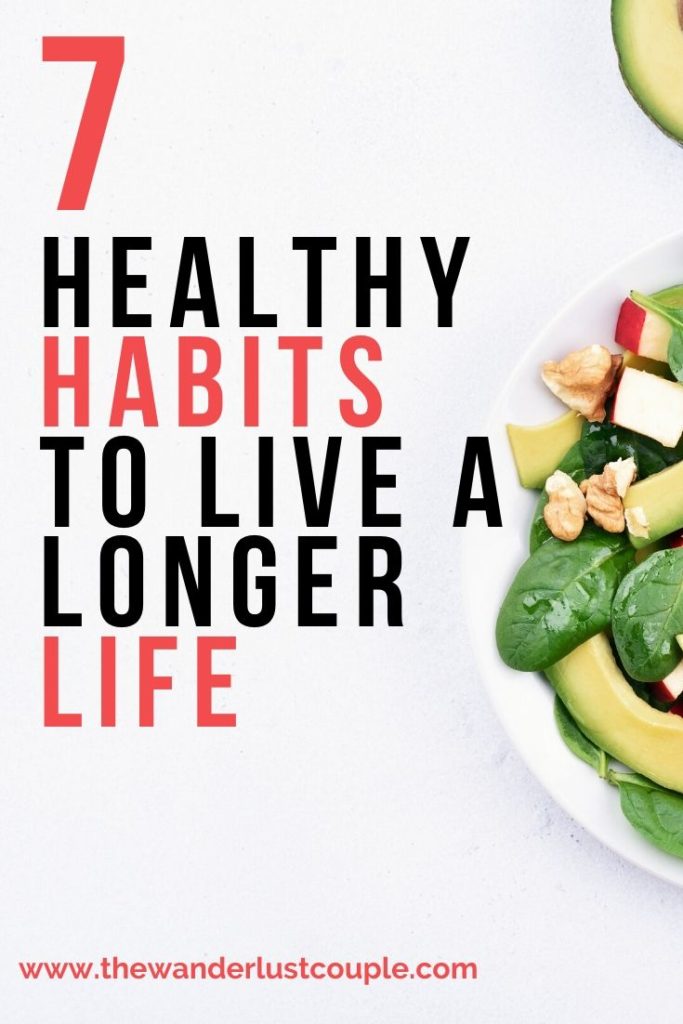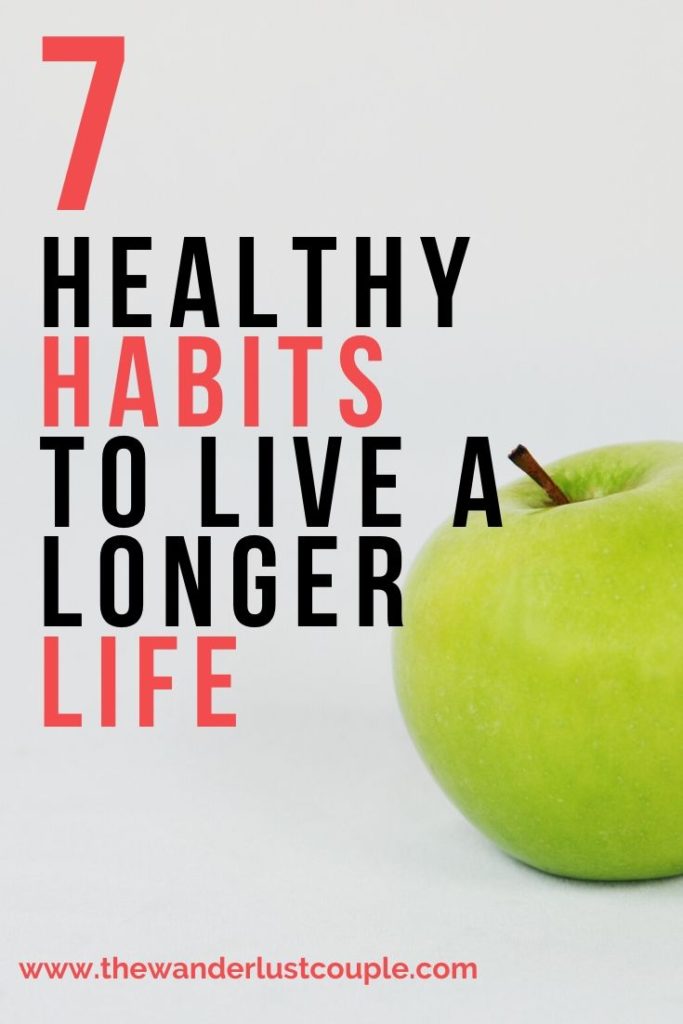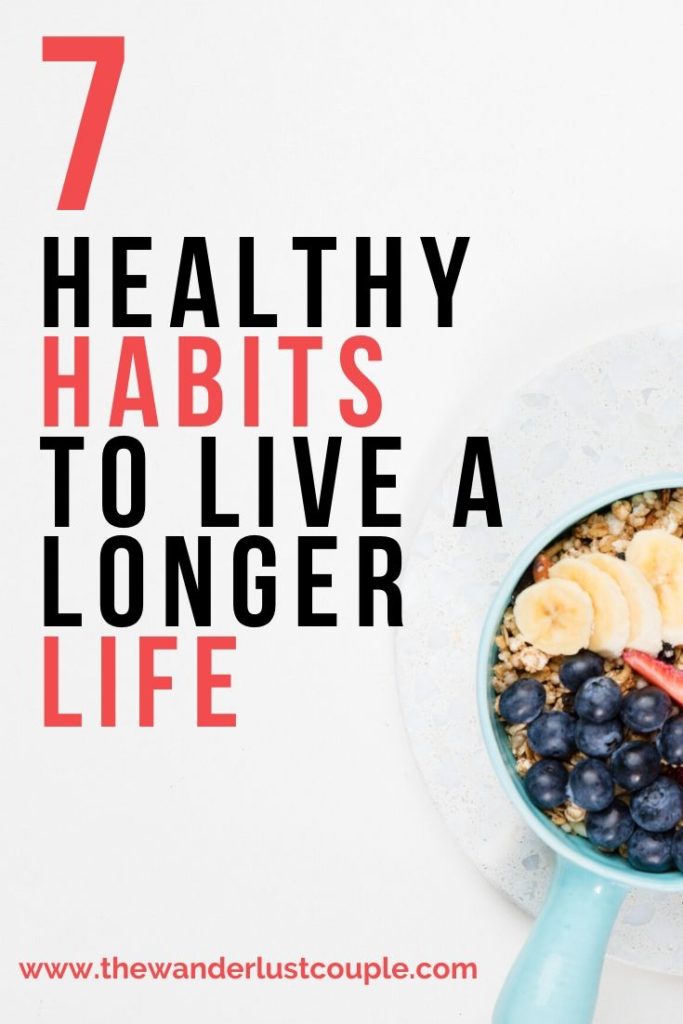7 Healthy Habits to Live a Longer Life

Maintaining healthy habits is the key to living a long life. A lot of people think living a healthy lifestyle is difficult, but it doesn’t have to be! If you can just implement a few small changes, you can achieve better health and happiness. Check out these easy to achieve healthy living habits:
Table of Contents
1. Get More Sleep
Getting the recommended amount of sleep per night doesn’t mean you just have enough energy for the day ahead. It can also improve your memory, lower stress, and help you to maintain a healthy weight. The recommended amount of sleep per night is between 7-9 hours depending on the person. We try to get at the very least 7 hours of sleep every night so our brains and bodies are ready for the day ahead!
However, there are some people who just can’t seem to get a good night’s sleep and this can lead to issues such as depression and chronic illnesses. You can avoid sleep problems by going to bed at the same time every night, avoiding caffeine in the afternoon, shutting off electronics one hour before bed, and turning down the thermostat to between 60-67 degrees Fahrenheit.
2. Eat a Healthy Diet
A healthy diet may look different for different people. For instance, we follow a Paleo lifestyle because we are both gluten and dairy sensitive. However, not everyone has gluten and dairy sensitivities and therefore a Paleo diet might not be the best choice for them.
The most important thing is to find a diet that works for you and stick to it, whether that be Paleo, Keto, Low-Carb, or a combination of several diets. If you are struggling, talk to a registered dietician about setting up a plan for healthy eating tailored to you.
Some things that will help you on your path to healthy eating habits include:
- Plan your meals out for the week before you go to the grocery store
- Bring healthy snacks to curb your hunger during the day like nuts or snack bars
- Drink plenty of water throughout the day
3. Exercise
The key to making exercise work for you is finding an exercise you enjoy doing. If you hate running, then don’t run! Find something else you enjoy doing like yoga or biking. Maybe even start your morning off with a 30 minute walk if exercising after work is difficult.
We already talked about how sleep can help with stress, well exercise is a huge stress reducer as well. That’s not just our opinion – it’s actually scientific. Exercise stimulates the production of endorphins, which are chemicals in the brain directly related to mood and are also the body’s natural painkillers!
Personally, we like running and going to the gym and lifting weights for 30 minutes a few times a week. We have both competed in half marathons, marathons, triathlons, and Spartan races in the past but these aren’t our daily workout activities. We normally just enjoy a 3 mile run when we aren’t training for a race.
4. Declutter
Have you ever looked at a cluttered closet or desk or garage and felt anxious? It’s a very natural response because your brain can’t focus on the goal at hand (to clean!) because there’s too much stimuli.
A few months ago on Netflix, a new show came out about decluttering called Tidying Up with Marie Kondo. The premise of the show is Marie, a petite Japanese woman, will come into a family’s cluttered house and teach them how to organize and declutter by getting rid of everything that doesn’t bring you joy.
Another great thing about decluttering is you can sell the items you no longer use or want on Facebook Marketplace, Craigslist, LetGo, or OfferUp. We recently went through our house and did this and made a few hundred dollars in the process that went straight into the vacation fund! So start decluttering and turn this healthy habit into cash!
5. Health Care Screenings
An annual physical exam is extremely important to identify any underlying issues and address them before they become a problem. For instance, during my latest annual physical exam, my doctor noticed a mole on my leg that appeared to be getting darker. I scheduled an appointment with a dermatologist where they biopsied it (and another further down my leg) and both came back severely pre-cancerous. Now, I go every 6 months to get checked for any new moles or moles that have changed in shape or color.
For women, it’s extremely important to go for your annual gynecological exam and mammogram. Cervical cancer is one of the number one cancers that kill women and early detection is key. For men over 50 years of age, prostate screenings become increasingly important as well.
Lastly, get into the healthy habit of visiting the dentist twice a year to keep your teeth and gums in top shape. You might be the best brusher and flosser in the world, but only a dentist can remove harmful plaque buildup. It’s also been discovered recently that gum disease can also lead to a whole host of chronic illnesses from heart disease to diabetes.
6. Build Relationships
Humans weren’t made to survive alone, we do best when we have people to help us, socialize with us, and relate to us. When we develop and maintain relationships with others, we feel good about ourselves.
To maintain these relationships we need to strive to accept and celebrate each other’s differences and actively listen to our family and friends when they are going thru a difficult time. This means putting down the cell phone or other electronic device and really taking the time to be with someone in the moment.
Here are some ways to maintain healthy relationships and stay close with friends and family:
- Have dinner together every night as a family
- Take a yearly vacation together
- Volunteer your time to help your friend on a project
- Get together with friends on a regular basis
7. Practice Mindful Gratitude
If you haven’t read Mindful Gratitude: Practicing the Art of Appreciation by Christel B. Wendelberger, we highly recommend it. She defines Mindful Gratitude as the following: Mindful Gratitude is the practice of looking up close at our sometimes messy, imperfect, busy, burdened, ordinary lives to see with fresh eyes the beauty, texture, depth and color of our individual landscapes and the enormous contributions of humanity to our personal knowledge, progress, and well being. It is the practice of finding, noticing, and, most importantly, deeply appreciating the unique meaning and magic that are intrinsic in our everyday experiences.
Here are some ways you can practice the healthy habit of Mindful Gratitude throughout your day:
- Write “thank you” notes to people
- Tell people why you value them
- Compliment a friend or co-worker
- Write down three things you are grateful for everyday
- Hold a door open for someone
- Say Thank You
We hope you take a look at this list of healthy habits and you are able to introduce at least some of our suggestions into your lives. Do you have any other suggestions that we didn’t think of? Drop a comment below!
Did you find this post helpful? Save it for later on Pinterest!



